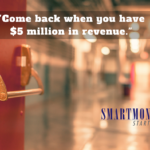So, you’ve started a company and hit the ground running with a group of happy customers. Now it’s time to raise investment in your startup, so you start to screen investors. Or do you?
If you’re like many first-time CEO’s, the answer is that you probably don’t. Rather, you’re thinking you should meet with any investor who has the money and interest after hearing your pitch.
But that can be a big mistake. As I shared in this personal story, choosing the wrong investors could cause you to miss out on a huge opportunity. In my case, that lost opportunity was $1.65 billion.
That’s billion with a “B.”
Here’s how to make sure you don’t make a similar mistake.
Why You Should Screen Investors
Many entrepreneurs feel lucky to just get a meeting with a potential investor. If you feel that way too, I totally get it. The fact that an investor has heard your pitch and wants to hear more validates both you and your business model. But the exhilaration you’ll feel in landing your first investor presentation will fade quickly if you end up pitching the wrong investor.
Who is the wrong investor?
The wrong investor is someone who brings money to your deal, but only money. Sure, you need money to accelerate growth in your business. But you need SmartMoney if you hope to also build value and, at the right time, achieve a lucrative exit.
 I describe how to find the right investors in the SmartMoney Playbook. It’s free, and you can grab it here.
I describe how to find the right investors in the SmartMoney Playbook. It’s free, and you can grab it here.
Actually, in some ways qualifying investors is like qualifying potential customers.
Imagine a young salesperson, eager to make his first B2B sale. He gets an email from a prospect asking him to fly out and demo is company’s marketing automation software. He jumps from his seat to tell his sales manager the good news and is ready to book his flight.
Fortunately, his sales manager has been around the block and knows a thing or two about qualifying, or screening, prospective customers. So he asks the young sales rep a few questions:
- What problem are they trying to solve with our product? What’s the financial impact to them of that problem?
- Did you discuss the problem and frame a possible solution, biased toward our product?
- Do we have experience in their marketplace to validate our solution?
- Who within their organization is impacted by that problem? Does it affect the CEO, CFO,…?
- If we could help them solve this problem, how would the decision be made? What role does your prospect play?
The sales rep slumps, knowing that he didn’t qualify the prospect. The sales manager knows he just saved the company money and the sales rep a lot of time. Not just time for the travel, but the many calls and meetings that may have occurred later before the opportunity ended in “no decision” or went to a competitor.
Raising investment, particularly from angel investors, is similar.
Why do I emphasize angel investors?
Because venture capital investors generally make their investment criteria clear on their website and in conversations. They want to see as many deals as possible, but only those that match their market niche, stage of development and funding level requirements.
Angel investors generally have far less strict criteria. Many cast a wide net, looking under any stone for an opportunity. But don’t feel too lucky if you get a meeting with one of these investors.
The simple truth is that “dumb money” meetings is a waste of time, and time is your most valuable and finite asset. If you’re in front of the wrong investors, you’ll likely spend months explaining your business model, over and over. Since the investor lacks expertise in your industry, you’ll spend far too much time educating and trying to convince them. In the end, you’ll likely invest (your time) in them, but they won’t invest in you.
And, even if they do invest in you, they’re the wrong investors. And I already shared how painful it can be to have the wrong investors in your deal.
The good news is that there is someone out there who understands your industry and the opportunity you’re targeting. These are the people you want to target because they “get it”. They have the knowledge and connections to help catapult your business to stratospheric valuations.
And it all starts with creating a target investor list.
Just as the sales manager knows how to qualify customers, you can apply the same approach to screening investors:
- Have they invested in your space before?
- Did they have a successful exit?
- What do they know about your customer’s behavior, needs and trends?
- Are they intimately familiar with your competitive landscape?
- Are they connected with larger investors (VC’s, etc.) that
Here, watch as I share my thoughts on why it’s so critical to screen for SmartMoney investors.
If you want to raise money quickly, get in touch with me. I’ll help you create your target investor list so you can accelerate your fundraising.








Pingback: Why investor's aren't listening to you - JD Davids()
Pingback: How to Choose Which Angel Investors to Partner With - JD Davids()
Pingback: Three Words You Don't Want to Hear When Trying to Raise Money - JD Davids()
Pingback: Getting a Term Sheet Changes Everything - JD Davids()
Pingback: Why investor's aren't listening to you Copy - JD Davids()
Pingback: Why "Smart" Money Investors are so Critical to Your Success - JD Davids()
Pingback: Top Reasons Why Your Investor Pitch Is NOT Compelling - JD Davids()
Pingback: How to Raise "SmartMoney" in the Shark Tank - JD Davids()